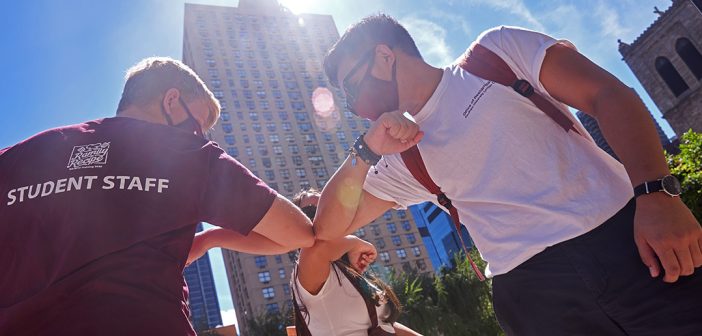
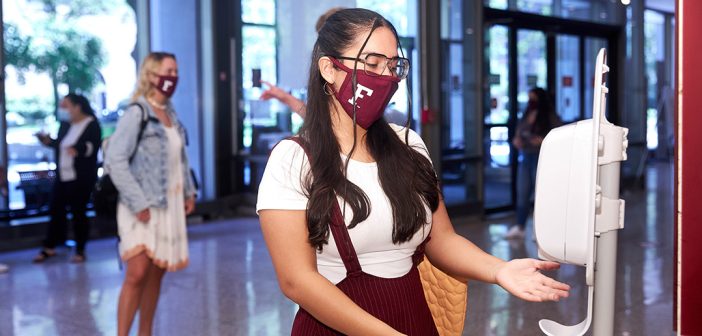
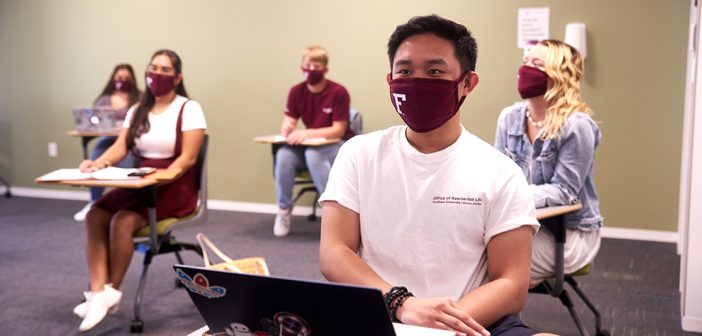 What’s the best way to communicate health-related warnings to young people, who are more prone to taking risks? A recent study by Fordham students and faculty offers some possible answers—and they’re closely related to Fordham’s Jesuit values.
What’s the best way to communicate health-related warnings to young people, who are more prone to taking risks? A recent study by Fordham students and faculty offers some possible answers—and they’re closely related to Fordham’s Jesuit values.
The idea for the study emerged in fall 2020. Fordham had reopened its campuses after its University-wide pivot to virtual instruction the previous March, and was requiring masks as well as other precautions to contain the coronavirus. Universities everywhere were doing similar things, hoping to avoid COVID-19 spikes that would force them to once again shift to completely remote education.
When this shift didn’t need to happen that fall at Fordham, students sighed with relief. And a student-faculty cohort in the psychology department grew curious.
“As a group that studies health behaviors especially among young adults, we were fascinated by this,” said Rachel Annunziato, Ph.D., associate dean for strategic initiatives and professor of psychology at Fordham College at Rose Hill. “I thought, ‘There’s probably something special about Fordham students that’s contributing.’”
She and her student researchers in the Pediatric Psychology and Health Behaviors lab prepared a survey that was completed by 92 students before the planned closure after Thanksgiving break. It asked about their level of compliance with masking and other measures to contain the coronavirus. It also measured motivators including empathy and concern for the collective good, which dovetail with the Jesuit identity of the University.
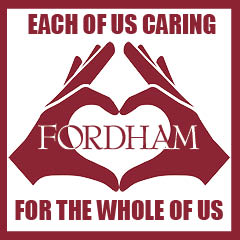 Maura Mast, Ph.D., dean of Fordham College at Rose Hill, was a senior author of the study, titled “Students for others: Correlates of adherence to COVID-19 guidelines.” The title reflects a key precept of Jesuit education that is constantly reinforced, noted one of the student co-authors, Kristina Stevanovic, FCRH ’22.
Maura Mast, Ph.D., dean of Fordham College at Rose Hill, was a senior author of the study, titled “Students for others: Correlates of adherence to COVID-19 guidelines.” The title reflects a key precept of Jesuit education that is constantly reinforced, noted one of the student co-authors, Kristina Stevanovic, FCRH ’22.
“From the second you arrive on campus, [Joseph M. McShane, S.J., now president emeritus of Fordham] talked about being men and women for others, and any Fordham event you attend where they’re talking about Jesuit values, it’s men and women for others,” she said. “Maybe it just is the fact that we hear it over and over again.”
Promoting Health Awareness in the Young
The study, published in July in the Journal of American College Health, is one of many to grapple with the question of how to get adolescents and young adults to take health precautions seriously, even though they’re more likely to take risks and may find it hard to make a behavior change if their peers aren’t doing the same thing.
A lot of the work in Annunziato’s lab centers on young people’s adherence to medication regimens after receiving liver transplants, so focusing on coronavirus precautions “felt like a natural shift,” said another coauthor, Rebecca Tutino, a doctoral student in clinical psychology at Fordham. She also noted that the topic was close to home for the student researchers.
“We [were]all students ourselves going through the same lived experience as everyone else who took part in this study.”
Students’ health behaviors weighed heavily on leaders as universities everywhere grappled with how to approach the fall 2020 semester, the study says. Out of 3,000 institutions surveyed by the Chronicle of Higher Education about their reopening modes, the study notes, 34% offered courses primarily online, 23% were primarily in-person, and 21% were in hybrid mode. Only 10% were fully online.
Fordham took a blended approach—after shifting to remote education in March 2020 following the pandemic’s outbreak, the University offered hybrid courses in fall 2020 and gave students the option of taking all their classes online. Residence halls opened, and masks, social distancing, and other precautions were required. If COVID cases had totaled 5% of the on-campus population, Fordham would have had to return to fully remote learning for two weeks, per New York state policy.
Rates stayed low and stable through Thanksgiving break, after which Fordham pivoted to remote learning for the remnant of the semester, as it had planned to do since the prior summer. The low COVID rates were a nice surprise, Tutino said—“We were like, what is going on here? What is it about our student body that is allowing for this to happen?”
Their study offers some insight.
Survey Results
Students completed a web-based Qualtrics survey during the month leading up to Thanksgiving break in 2020. The results showed students were largely following the rules—for instance, more than 90% were washing their hands and wearing masks both inside and outside, either all or most of the time. More than 90% were mostly abiding by travel restrictions, and nearly 70% were practicing social distancing all or most of the time.
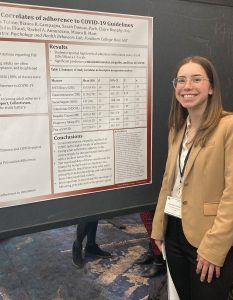
Their reasons for complying were the key finding, Annunziato said. A less-prominent reason was social support, or feeling like one’s peers support your actions—usually a strong predictor of health-related behaviors. Also less prominent was self-efficacy, or one’s sense of personal control over an outcome or circumstance.
Instead, students’ behaviors were more driven by empathy, fear of COVID, taking others’ perspective, and a sense of collective benefit. Stevanovic noted the interrelations between these reasons—“If you’re able to put yourself in somebody else’s shoes, I think you’re a little bit more likely, then, to have a collectivist attitude, and espouse greater empathy,” she said. “I can just clearly see how those constructs end up relating and being correlated to one another.”
Tutino said the findings line up with what she saw among students in her program—respecting other people’s boundaries, taking care to sit far enough apart in class, or perhaps opening windows to make everyone feel comfortable and safe, she said.
The study notes some possible limitations: for instance, most respondents were women, and they held more liberal political views. And they had chosen to attend a Jesuit university that embraces certain values.
Future Directions
But the study still offers useful insights, Annunziato said. “In my field of pediatric psychology, I’ve talked to a lot of folks who are intrigued by this,” she said. “We really struggle in terms of developing interventions that are meant to cultivate or bolster health behaviors. I think there’s excitement that the Fordham experience has helped to maybe fill in some missing pieces when it comes to motivators of young adults.”
The findings show that empathy and collectivism could have bearing on other health behaviors such as underage drinking or getting vaccinated, the study says.
Stevanovic presented the research in March 2022 at the Eastern Psychological Association Conference in New York City, where she saw a lot of research projects related to COVID. Because of this experience, “I think I really just want to study health behaviors, ultimately, and population health,” said Stevanovic, who is now a clinical research coordinator in psychiatry and behavioral sciences at Memorial Sloan Kettering Cancer Center.
Tutino noted that “we got so many responses right away” after posting the study’s questionnaire.
“To see such a high response rate and to have people sending the links to each other and sharing it without us even having to ask, that was really wonderful,” she said. “I feel like all of us were thinking, ‘Why aren’t we doing this more?’ This is a population that’s happy to help us with our research, and we can really learn so much from them.”
]]>After John E. Toffolon Jr., GABELLI ’73, ’77, died on April 26 following a battle with cancer, his family asked for memorial donations to be sent to Memorial Sloan Kettering Cancer Center and to Fordham—specifically, to its New Era Fund supporting the men’s and women’s basketball programs in their drive for national prominence.
About $400,000 in memorial donations has come in to date, a sign of the strong interest prompted by Toffolon’s leadership in advancing the basketball programs, said Fordham’s athletic director, Ed Kull.
“This strong community of donors is a testament to John’s passion for the University,” said Kull, adding that Toffolon’s memory will be honored at a home basketball game this season. “I want to thank all of those who have given to Fordham basketball in memory of John Toffolon. Thanks to our community’s strong support for the New Era Fund, his passion for the program will continue on.”
That passion took root in his student days, when Fordham basketball became a national powerhouse that sold out Madison Square Garden and fueled fierce pride in the University. In 2020, as a trustee fellow, Toffolon co-founded the New Era Fund as part of the University’s current $350 million fundraising campaign, Cura Personalis | For Every Fordham Student, which seeks to enhance the entire Fordham experience. He brought many other supporters along through his example.
In fact, he had been setting an example of giving back and helping others for most of his life—and not just in the arena of basketball.
Forged at Fordham
During his student years, Toffolon was active in many areas of University life, including United Student Government, and seemed to be able to move in every circle of students, as described by two of his classmates, David and Don Almeida, twin brothers and 1973 graduates of the Gabelli School of Business. “He was very much a Fordham guy,” said Don Almeida, a Fordham trustee fellow, “and when he graduated, he remained that for the rest of his life.”
After graduating, Toffolon launched his investment banking career in the management training program of the Federal Reserve Bank of New York and came back to Fordham a few years later to earn an M.B.A. That’s when he met his wife, Joan C. Toffolon, GABELLI ’77, a fellow student in the program. He went on to hold leadership roles at First Boston Corporation, Nomura Securities international, and the Cowen Group, among other firms.
He was board chairman at Cowen during its 2009 merger with Ramius LLC, and showed genuine concern for everyone in the merged company, said Jeffrey Solomon, who was a managing member and founder of Ramius.
“John was always well intended, thoughtful, and wanted to make sure that he was making a positive impact in the lives of others,” said Solomon, now chairman and CEO of Cowen, a New York-based banking and financial services firm. Toffolon “wanted to make sure that, through his board stewardship, we were doing the best things we could for everybody at Cowen,” he said.
Giving from the Heart
That care and concern extended to his philanthropy. “John was the real deal,” said David Almeida, a board member with the Making Headway Foundation, which serves families of children diagnosed with brain or spinal cord tumors. Toffolon was a longtime supporter, and “would actually call me up every year to make sure I got the check,” a level of personal attention that meant a lot to him, Almeida said.
Toffolon gave to many organizations supporting health, education, and youth development, and played a leadership role in Fordham’s fundraising efforts. He often gave in partnership with his wife, Joan; in 1995, they created the Joan and John E. Toffolon Jr. Presidential Endowed Scholarship Fund for women attending the Gabelli School of Business.
The first recipient of the scholarship, Cindy Vojtech, Ph.D., a 2000 graduate of the Gabelli School, periodically met Toffolon for lunch. “In any conversation, it was just very clear that he was very enthusiastic about this school and about giving back and trying to … help shift the industry” toward having more women represented in its ranks, said Vojtech, a principal economist at the Federal Reserve Board and a member of the Fordham University President’s Council.
The Toffolon scholarship made it possible for her to come to Fordham and pursue her career dreams in finance and economics, she said. Today, she is paying it forward by creating a scholarship of her own, so that future students can enjoy the Fordham community and support that she did. “It’s just such an amazing gift,” she said.
Another recipient, Samantha Barrett, GABELLI ’21, met John Toffolon on a few occasions, joining him for a Fordham basketball game and dinner at Roberto’s on Arthur Avenue in the Bronx in 2018. “He was just a truly wonderful man, with the kindest heart, and I am a better person for having known him,” she said.
It was humbling and amazing, she said, to learn that the Toffolons’ scholarship would be covering the full cost of her Fordham education. “In that moment, I knew that I needed to have a college career where I did my best—for myself, for John and Joan, for my family, for those around me,” said Barrett, now an analyst at Jefferies Credit Partners in New York City. “I kept John and Joan in mind in every decision I made at Fordham,” wanting to make them proud, she said.
Before the launch of the New Era Fund, the Toffolons made many gifts to support athletics. At the Lombardi Center on the Rose Hill campus, they funded the installation of a wood floor on a practice court—now named in their honor—that is sometimes used by the basketball teams.
That gift seemed to come out of the blue, said Frank McLaughlin, FCRH ’69, athletic director emeritus at Fordham and special advisor to the director of intercollegiate athletics and recreational sports.
“He would do a lot of things unannounced like that, to help people,” McLaughlin said.
Days of Glory
McLaughlin knew Toffolon for about six decades, since Toffolon was a student and he, McLaughlin, was a young assistant basketball coach at Fordham for one season under head coach Richard “Digger” Phelps.
“In 1970–1971, it was a magical year where we were a national power, and he saw what that meant to everybody,” McLaughlin said. “There was a tremendous pride in the institution.”
The Rams went 26-3 that year, playing twice before sold-out crowds at Madison Square Garden—beating Notre Dame the first time and falling to Marquette a week later. Fordham advanced to the “Sweet 16” in the NCAA tournament and finished the year ranked ninth in the country.
“Everybody was coming to see us, and Madison Square Garden was full,” Don Almeida said. “I was scared the place was going to fall down, it was shaking so much [with]everybody standing and rocking.”
The school spirit had a unifying effect, he said. “You had ROTC marching in Edwards Parade and you had anti-Vietnam War demonstrations going on all over campus, and at night, everybody was at the basketball game,” he said.
“For the four years that [John and I were] at Fordham, we had very, very respectable basketball teams,” which set a benchmark for the team’s future efforts, Almeida said. “No matter what happened thereafter, we knew what we could do, because we had done it.”
Launching a New Era
Almeida and Toffolon were part of a group led by Fordham trustee Darlene Jordan, FCRH ’89, that started the New Era Fund to boost the basketball teams as a unifying source of Fordham pride and enhance the University’s national profile.
The fund pays for the recruitment of coaching talent and various supports to help student-athletes do their best in class and on the court. With its help, the men’s team improved to a 16-16 record last season under then-head coach Kyle Neptune, and it’s seeking further progress this year under Keith Urgo, who became head coach in April.
Toffolon “was very passionate about seeing the New Era Fund get off the ground” and cared deeply about helping the student-athletes, said Frank Aiello, GABELLI ’76, a supporter of the fund and member of Fordham’s Athletics Hall of Fame committee.
He kept coming to Fordham basketball games while undergoing cancer treatments. “He was all in,” Don Almeida said. Toffolon knew and interacted with all the players, and the entire men’s and women’s teams came to his wake, along with members of the coaching staff. “There wasn’t a dry eye in the place,” he said.
Following a Mass of Christian Burial on May 5 at St. Joseph’s Church in Bronxville, New York, John Toffolon was laid to rest at Gate of Heaven Cemetery. Survivors include his wife, Joan, their daughters, Ashley and Allison, and his sister, Penley Kidd (Douglas).
“There isn’t a day goes by when I am not saddened that he is no longer here to support us. But he’s there in spirit, I’ll tell you that much,” McLaughlin said. “He was an inspiration.”
To ask about contributing to the New Era Fund, contact Kara Field, director of athletic development and assistant athletic director, at 973-223-2157 or [email protected].
Learn more about Cura Personalis | For Every Fordham Student and make a gift.
]]>That was the message from activist Kevin Powell, who drove the point home with stories from his own life during a March 9 talk at Fordham.
Throughout elementary and high school, for instance, “I didn’t have a single black or Latino writer in my education [curriculum],” said Powell, an author and cofounder of the activist group BK Nation. “So when we think about diversity, I also think about how we are… miseducated. To me, it’s not a real education if you don’t see yourself in your education.”
He gave the keynote address on March 9 at Fordham’s fourth annual Diversity Leadership in a Global Society conference, organized by the offices of career services and multicultural affairs in concert with several employers. Fordham’s Bronx African American History Project also supported the event.
Representatives of several entities—Memorial Sloan Kettering Cancer Center, Viacom, JPMorganChase, and the Association of American Publishers—spoke about their diversity-related efforts and offered career advice. Fordham professors and administrators held talks on topics including leadership and the politics of identity.
In his address at the end of the day, Powell told students to speak up if they see people of color, women, the LGBTQ community, or other communities being excluded.
“Whatever you decide to do, I feel that you all have a responsibility in your careers to challenge the lack of diversity, the lack of equality,” Powell said, noting gender pay gaps in particular.
“It can’t just be the women raising their voices,” he said. “Men, we’ve got to stand up against patriarchy, sexism, misogyny, and say, ‘Hey, this is unfair that they’re not being paid the same wage as me and they’re doing as much work, if not more work, than me.’
“Let’s make sure other voices are being heard,” he said. “If you really believe in diversity, really believe in democracy, then let’s make sure those voices (are at) the table.”
The conference theme, “Coming to the Table: Facing Your Fears,” referenced the fear that can keep people from celebrating their personal differences or embracing those of other people.
Workshops dealt with various fears, like the fear of saying the wrong thing, and also the need to appreciate other people’s perspectives, whether stemming from race or gender or age or life experience.
Student Jose Munoz was able to network with speakers from the various companies and also to meet more students who fall outside his orbit at Fordham. He noted that the diversity at Fordham is a precursor to what students will find in the workplace.
“Whatever it is you decide to do, people are not always going to be like you,” said Munoz, a senior economics major in the School of Professional and Continuing Studies. “They might not be the same ethnicity, maybe they don’t have the same upbringing financially.”
“Sometimes, somebody from a different background might give you a fresh perspective on something you’re working on that you would have never seen.”
Isabel Wallace-Green, a freshman dance major at Fordham College at Lincoln Center, came to the event because she’s found far more diversity at Fordham than she experienced in her home town and wanted to learn more about it. Her classmate Mikaela Brandon, also a dance major, came because of an interest in diversity and social justice.
In closing remarks, Juan Carlos Matos, assistant dean and director of the Office of Multicultural Affairs, spoke about the need to overcome the fear of failure in fostering greater inclusiveness.
“As we begin to understand that failure is not necessarily always what we fear it to be, but look at it as more of an opportunity … we can continue to move forward as a society,” he said.
]]>